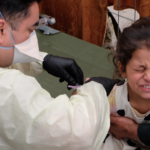Strengthen the taboo against biological and chemical weapons
By Filippa Lentzos | July 26, 2018
 US service members conduct a chemical warfare exercise.
US service members conduct a chemical warfare exercise.
In some ways, the fight to reduce threats from biological and chemical weapons looks like a roaring success. Chemical weapons have been prohibited by international treaty for more than 20 years, biological weapons for more than 40. The vast majority of the world’s nations are party to both treaties, and not coincidentally, these weapons are shunned. The international community has effectively devalued them as military options. Contrast that to nuclear weapons, which are considered status symbols to be paraded around on national days of celebration, and which major powers say they require for national security. By comparison, the fight to eliminate chemical and biological weapons looks quite successful.
On the other hand, the threat posed by these types of weapons is growing greater. While chemical weapons remain widely considered unacceptable, the international taboo against using them has weakened in the last five years. We have seen repeated use of unconscionable weapons on the battlefield and against civilian populations, particularly in the Syrian civil war, with both the government and ISIS deliberately targeting civilian infrastructure, including schools and hospitals. Assassination attempts in Malaysia and the United Kingdom have involved unprecedented use of sophisticated nerve agents. These recent chemical weapons attacks have considerably weakened disarmament principles and the international institution—the Organisation for the Prohibition of Chemical Weapons—set up to support them.
At the same time, advances in science and technology are changing the nature of chemical and biological warfare, in many cases making these weapons easier and cheaper to develop. Individuals, states, and non-state actors have new opportunities to exploit readily available technology. For instance, the range of malicious uses for synthetic biology is rapidly expanding, as a 2018 study ordered by the US Department of Defense highlighted.
This is all taking place against a backdrop of increased global militarization, a more complex world order, and the emergence of new kinds of weapons, notably cyber weapons and artificial intelligence. As of 2017, global military spending was higher than it had been at any time since the fall of the Berlin Wall. Unrestrained military procurement and modernization is creating distrust and exacerbating tensions. The Cold War superpower dichotomy gave way to a multipolar world where new governments push different agendas and exert substantial power. Significant non-state actors, from private sector companies to foundations to super-empowered individuals, wield growing influence over politics and decision-making. These developments test the international community’s post-World War II system of collective security, which is based on disarmament, a strategic set of tools encompassing measures not only to eliminate and destroy weapons, but also to prohibit, restrict, regulate, reduce, and limit them.
Our challenge is cut out for us. How should the international community respond? Is what we’re doing enough? The effort to strengthen the disarmament regime and sustain the bans on chemical and biological weapons will rest on two foundational pillars: First, responsible science, and second, the building up of norms, which are the shared values that shape official policies, laws, and treaties. While there is movement in the right direction on both fronts, a more coordinated, global effort is still missing.
On the right track. The news is not all bleak. The disarmament community has recently taken significant steps towards restoring the norm against chemical weapons. In January 2018, around 30 states established the so-called #NoImpunity partnership to identify perpetrators of ongoing chemical weapon attacks in Syria, and ultimately prosecute them. Then, in light of chemical weapon use in Syria and assassination attempts with a novichok nerve agent this year and with VX in 2017, the United Kingdom called for a Special Conference of the Chemical Weapons Convention (CWC). It took place in June and built on the momentum of #NoImpunity. A majority of CWC member states voted to reaffirm the ban on chemical weapons and to strengthen the OPCW’s ability to respond to violations.
Unfortunately, the substantial state-initiated norm-building activities in chemical disarmament are not mirrored in the biological field. There has, however, been an eruption of bottom-up efforts to sustain the norm against misusing biology.
One of the big challenges is that technologies to manipulate organisms’ genetic make-up are becoming cheaper, easier, faster, and more accessible to a larger range of people. This has increased security concerns about the science, and focused a great deal of policy attention on non-traditional research communities. These communities have responded, though, with innovative new programs that promote responsible conduct of research. In the competition put on each year by the International Genetically Engineered Machine Foundation, for instance, the undergraduate participants are required to grapple with biosecurity questions raised by synthetic biology in general, and by their individual projects in particular, in an attempt to cultivate a workforce mindful of all potential uses of its products. In another example, amateur biologists working in do-it-yourself biological community labs have developed aspirational codes that uphold such principles as responsible behavior, open access, transparency, peaceful purposes, and accountability.
Elements of the traditional research community have been active in this area too, for example with biologists and life scientists developing national or regional codes of conduct, often in partnership with national academies of science. Scientists in Cuba, Germany, Indonesia, Japan, Netherlands, and Switzerland have been among the leaders of these efforts. Journal publishers and funders have put in place security review policies, and more recently, sponsors and supporters of gene-drive research, including the Gates Foundation, the Pasteur Institute, and Wellcome Trust, have committed to a set of guiding principles to support responsible development.
Meanwhile in the private-sector biotech industry, gene synthesis companies have established the International Gene Synthesis Consortium to apply a common protocol to screen “the sequences of synthetic gene orders and the customers who place them.” The consortium currently represents approximately 80 percent of commercial gene synthesis capacity worldwide.
The explosion in bottom-up initiatives over the last decade indicates a growing recognition of security concerns, but also highlights the difficulty of developing policies on responsible research when fast-paced scientific advances are constantly moving the goal posts.
There have also been recent positive developments at the United Nations to reduce dangers posed by biological and chemical weapons. Specifically, UN Secretary-General António Guterres launched a new Agenda for Disarmament on May 24.
The agenda sets two overarching tasks for the international security-policy community that cut across all weapon categories. These are, first, to devalue the role of military options in seeking security, and second, to re-establish the role of disarmament as the safer, smarter, and more effective means of seeking security.
In the biological field, the new Agenda for Disarmament emphasizes strengthening the Biological Weapons Convention, establishing a dedicated institutional capacity at the United Nations to investigate allegations of biological weapons use, and developing a framework for coordinating an international response should biological attacks occur.
More to do. The challenge in the biological and chemical fields is to reinstate the importance of disarmament and to sustain the norm against misusing biology and chemistry.
The time has come for a collective effort from the international security-policy community. The Secretary-General’s initiative provides a useful stepping-stone to launch a top-down initiative that carries forward the norm-building momentum in the chemical field and recognizes, echoes, and unifies the bottom-up calls for responsible science in the biological field.
A high-level summit on science and security, coordinated by the United Nations and supported by governments, would be one way of achieving these goals. A summit would give governments the opportunity to declare science security a global priority and agree on the responsible use of science and technology for the good of the world. Such a summit could also lead to creation of a UN-coordinated network of experts focused on science security, with representatives from international organizations, non-governmental organizations, national academies of science, academia, and private industry. Last, but not least, the United Nations should develop an agenda for how to cope with science and technology in the next 10 to 25 years.
There are some who view the Secretary-General’s disarmament initiative as unambitious. Yet while it may not include many operational novelties, the fact that Guterres is throwing his political authority behind disarmament lifts up its political importance and creates an opportunity. It is now up to governments to run with it.
Together, we make the world safer.
The Bulletin elevates expert voices above the noise. But as an independent nonprofit organization, our operations depend on the support of readers like you. Help us continue to deliver quality journalism that holds leaders accountable. Your support of our work at any level is important. In return, we promise our coverage will be understandable, influential, vigilant, solution-oriented, and fair-minded. Together we can make a difference.
Topics: Biosecurity, Chemical Weapons















